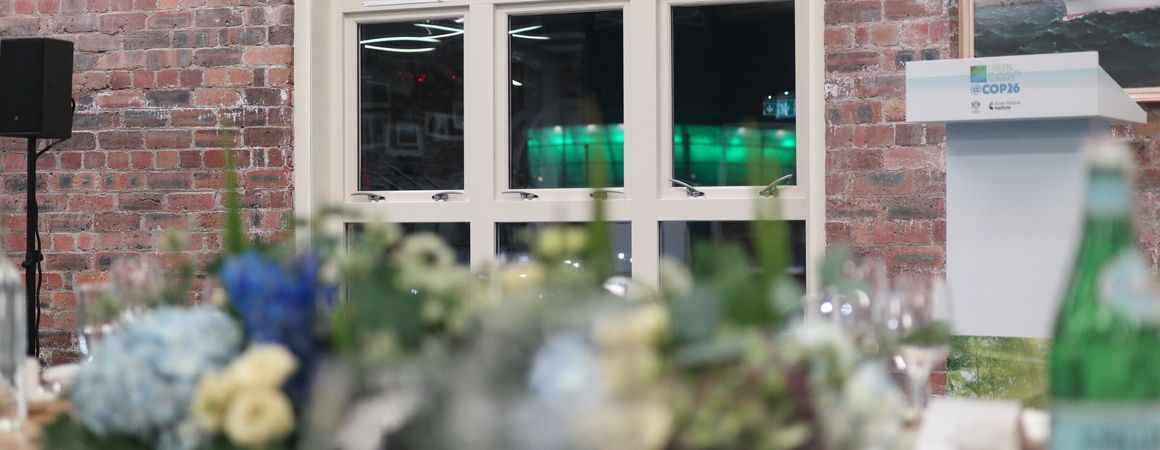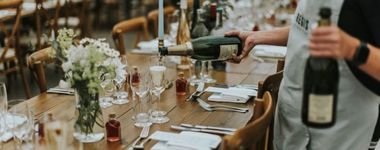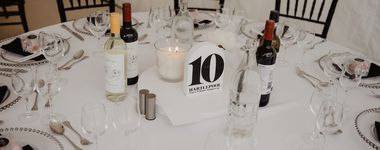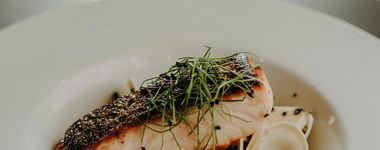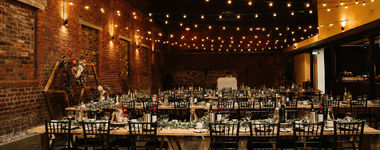Following on from the successes of COP26, we at Regis Banqueting Ltd are continuing to commit to being a more sustainable company. During the duration of the conference we learned a lot about sustainable eating, processes, and actions, and as a result have updated our sustainability policy in line with our learning.
The five key areas, we believe our business can commit to continuous development when it comes to sustainable practices are food, waste, power usage, cleaning, and transportation. Below are listed the measures we have in place relating to each of these five areas:
Food
As we continue to grow as a business, the amount of produce that passes through our production kitchen is increasing exponentially. As a result, we are very conscious of ensuring how we source, prepare and dispatch food is the most sustainably focussed as we can. We have several policies in place to ensure that this remains to be the case:
We are fully committed to the use of local suppliers for all our produce – the majority of our fresh fruit, meat, and vegetables come from The Fresh Food Company, ABR Butchers, and The Fish People.
Whilst we have standardised menus, featuring produce that can be sourced all year round, we are committed to ensuring as many elements as possible of each dish are made up of seasonal produce ie. Seasonal vegetables feature on all our menus, and our clients are notified that the exact vegetables will be dependent on the seasonal produce at the time of their event.
When we bring in produce from our local suppliers, we aim to use 100% of the produce we receive. For example – when we are buying meat on the bone, we will use the bones and trim for stock; likewise, if we are buying in vegetables, we will use off-cuts to make soups for staff lunches. Using all the produce ensures that we are not wasting any part of the produce.
Ultimately, leftover food tends to be unavoidable ie. Guest numbers are reduced last minute; suppliers' sale quantities are slightly above that which we require; last-minute cancellations all leave us with leftover produce or prepped food. If this happens, we are committed to supporting local charities and those in need – we send a lot of our leftover food to local initiatives such as Inspire Housing Development and Cumbernauld Resilience. As we continue to travel across the country, we are constantly seeking out ventures close to the venues that we are catering who will accept any leftover produce to avoid waste.
Waste
Due to the vast number of functions which we cater, our focus is increasingly on ensuring the quantity of waste which we produce is minimised. This includes both within our production kitchen and when we travel to events across the country.
We are fully committed to removing single use plastics from our premises. We currently use reusable plastic platters for our buffets, though are considering a move away from these to recyclable alternatives as while their reusable nature is a considerable factor for their usage, when they come to the end of their lifespan disposal is sub-optimized. We have now removed all single use plastic cutlery, cups, and packaging from our production kitchen, though aim to continue pushing for more recyclable or compostable products to replace existing products.
All our staff are trained by our environmental officer on the use of the recycling facilities that we have on site – we actively support the recycling of paper; mixed tin, plastic, card; glass; food; and cooking oil. Our aim is to have any general waste as our least required collection. We have on-site facilities for the recycling of each of these products and also provide our team with separate bins for the continued recycling of these products at the events that we travel to.
Power Usage
Our base kitchen is open 7 days a week, and we are very conscious of the power output which we put out. In order to ensure we have minimal excessive power output; we have the following policies in place:
We are conscious that every appliance that we are not using should be switched off, and our kitchen managers are continuously monitoring usage to ensure where possible any equipment which does need to be used is optimised. Likewise, within our office, all our computers and office hardware is switched off as soon as employees leave their workspace.
Our kitchen is set up in a way to ensure optimal operation ie. Large ovens, or items that produce a lot of heat are not set up by perishable produce or refrigeration units to ensure there is no impact on produce which must be stored correctly.
In our new kitchen space, we have installed motion-censored lights, to ensure lights are only used when employees are working in that space. All our other lights on site are energy-efficient LEDs.
Cleaning
As our production has increased, so has the requirement for cleaning of our premises and all equipment used. This is a huge operation for our team, and we aim to continue looking for sustainable alternatives to the practices that we have in place:
We currently send all our cater hire back to our supplier dirty, to allow them to bulk wash the items from our order with their other orders. With this, we hope to achieve a reduced number of washes, compared to that which we would be able to offer.
The cleaning products that we use all come in reusable and recyclable packaging, though the contents of these do contain phosphates and VOCs – this is something that we are looking to improve on going forward.
Transportation
As a company that travels over the entirety of Scotland and the Islands weekly, we are very conscious that our method of transportation may not always be the most sustainable and are constantly seeking new ways to limit the emissions that we are spreading. We currently have numerous policies in place to ensure our fleet and staff are as environmentally conscious as possible:
Firstly, we commit to ensuring the refrigerated vans are as sustainable as possible – we currently have a fleet of Nissan NV400 vans, which have low end torque and a fuel consumption of 36.7mpg which comes out very favourably in relation to other alternatives. Each van also has an ‘eco mode’ suitable for long journeys, particularly motorway driving. We have been unable to source electric or hybrid vehicles which continue to remain as sustainable when fitted with a refrigeration unit, though if such an option were to become available this is something that we would consider.
We are aware that the refrigeration units within our vans may be a cause for concern, though these are sourced to ensure they are not increasing our carbon footprint – each of our vans is insulated to ensure maximised efficiency; these are serviced separate to our vans on a yearly basis to insure continued efficiency; and are only used when required and not left switched on when not in use.
We are committed to continued maintenance of our vans to ensure that there is no damage causing faults within the vehicle which may result in breakdowns or fuel leaks.
Every day within our office, we ensure that we are planning delivery routes and transportation to functions to be as streamlined as possible. For instance, if we have a delivery to Edinburgh, but are also dispatching a buffet to the surrounding area, we will send both together to avoid sending multiple vehicles to one area. Every day we have numerous deliveries in the local area, and as a result use route planning technology to ensure that the number of vehicles and the time that vehicles are on the road is reduced to be most efficient.
When traveling further afield, we have a bank of local staff which we can call upon to work alongside us, ensuring that we can cut out the environmental impact of staff travel. For instance, we have many staff based in Dundee, who assist us with functions as we cater in that area weekly.
Where local staff are not available, we ensure that all our staff have shared transport to the venue which ensures the minimum number of vehicles attend any site which we are catering at.
If we are traveling further afield, we will commit to using local suppliers who can deliver directly to the venue, for instance, the use of Scotts Cater hire for furniture hire to venues near St Andrews; or Plate Hire and Clean for tableware and furniture hire in the Edinburgh area.
Our facilities have on-site safe parking spots available for bicycles, to encourage staff to take a more environmentally friendly approach to getting to work. This has incentivised numerous members of our local staff to cycle to work instead of driving. Our base is also positioned a five-minute walk from a train station which is 25 minutes from both Glasgow and Edinburgh, with alternative bus routes to the local community also within walking distance – we promote the use of public transport and have reduced parking spaces to account for this. There is safe public parking, and electric car charging points a five-minute walk from our base.
It is our sincere hope that through the continued use and development of the above practices, we can continue to promote sustainable operating within our company and within our local community.

